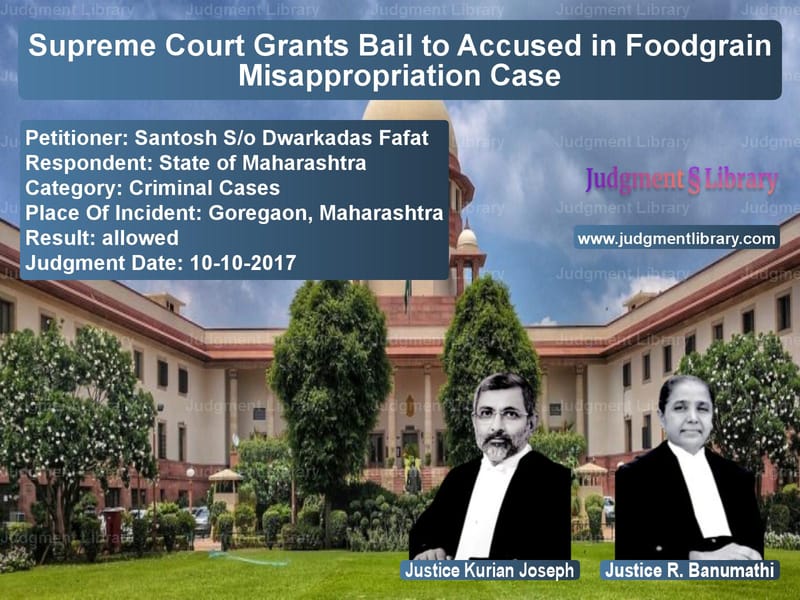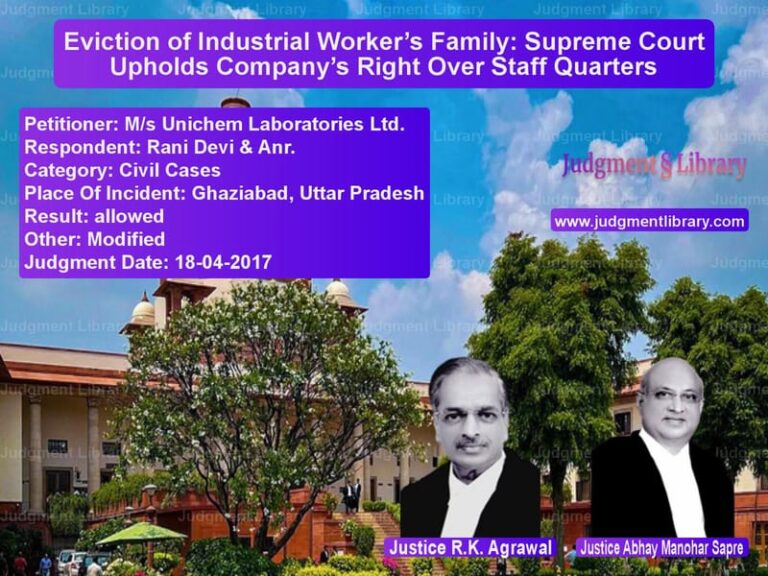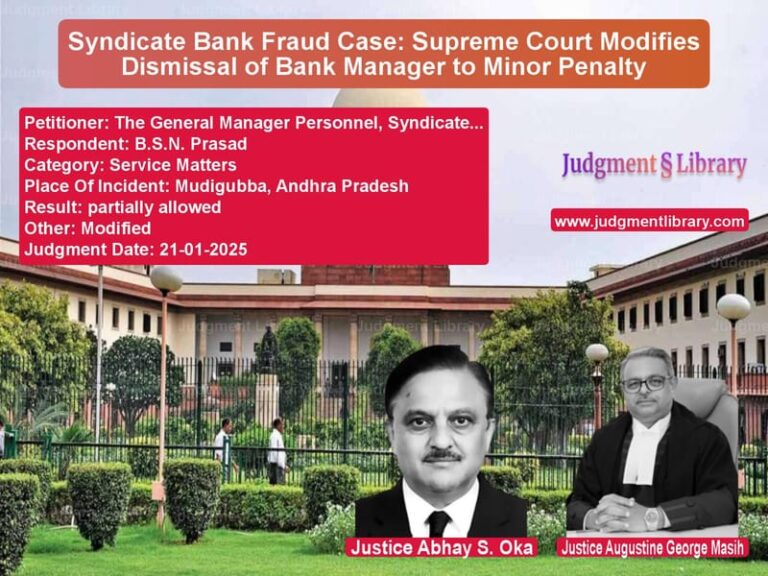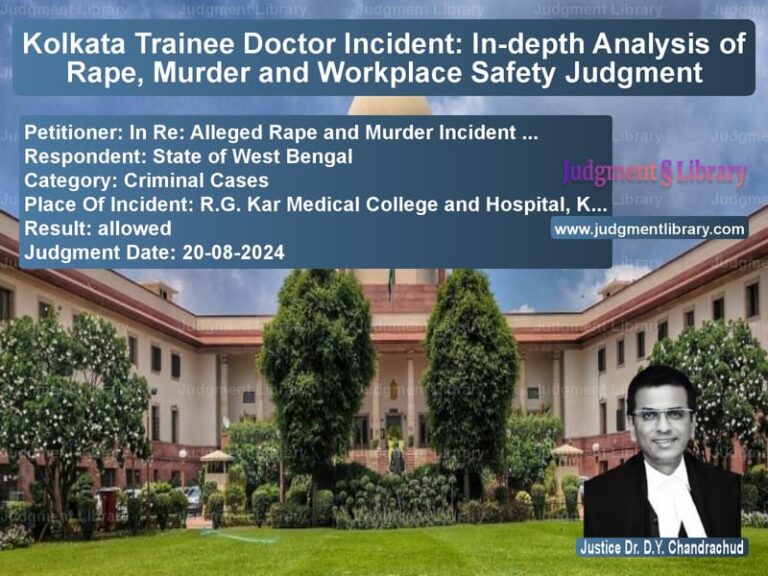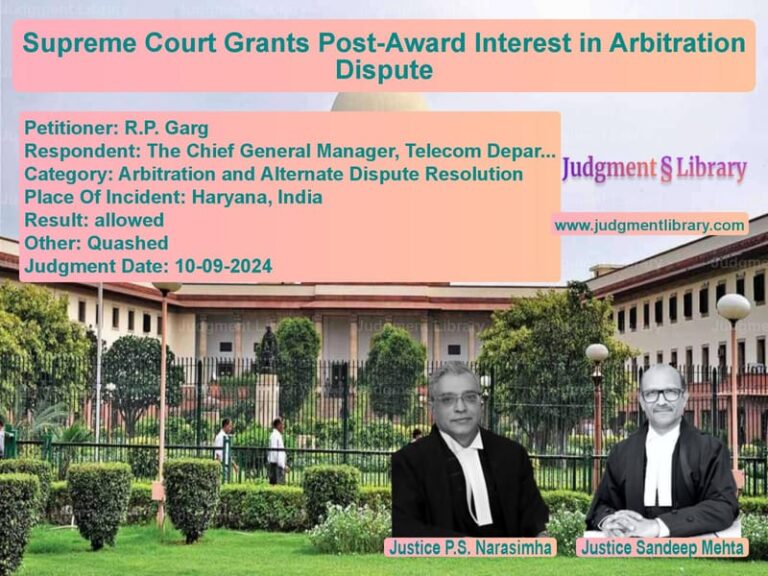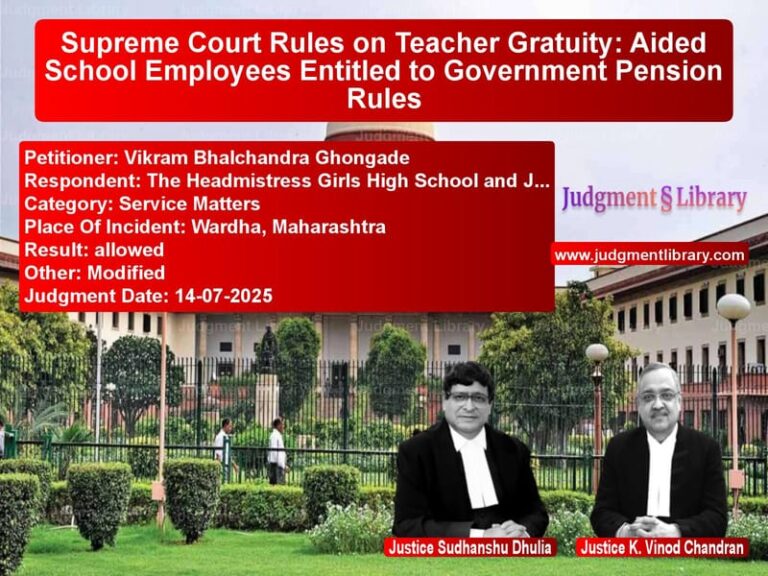Supreme Court Grants Bail to Accused in Foodgrain Misappropriation Case
The Supreme Court of India, in the case of Santosh S/o Dwarkadas Fafat vs. State of Maharashtra, delivered a crucial judgment on October 10, 2017, regarding anticipatory bail in a case involving the misappropriation of food grains meant for public distribution. The Court granted bail to the accused, ensuring procedural fairness while allowing the investigation to continue.
The case arose when an FIR was registered at the Goregaon Police Station, Maharashtra, under Section 408 of the Indian Penal Code (IPC), 1860, read with Sections 3 and 7 of the Essential Commodities Act, 1955. The accused, Santosh Fafat, was alleged to have received misappropriated food grains meant for public distribution. The Additional Sessions Judge, Gondia, rejected his application for anticipatory bail on October 7, 2016, a decision later upheld by the Bombay High Court, Nagpur Bench, on October 24, 2016. The Supreme Court heard the matter after the accused appealed against the High Court’s ruling.
Petitioner’s Arguments
The petitioner, Santosh Fafat, contended that:
- He had no involvement in the misappropriation of food grains and was falsely implicated in the case.
- There was no direct evidence linking him to the crime, and the allegations were based on the statement of another accused.
- He was willing to deposit the alleged misappropriated amount of Rs. 45,08,469 to demonstrate his bonafides.
- He was cooperating with the investigation and had no intention of absconding.
- The refusal to grant bail was causing undue hardship and violated his fundamental rights.
Respondent’s Arguments
The respondent, State of Maharashtra, argued that:
- The accused was actively involved in the misappropriation and benefited financially from the crime.
- The misappropriated food grains were meant for public distribution under the government scheme, and any diversion was a serious offense.
- The accused was not cooperating with the investigation, making custodial interrogation necessary.
- The Bombay High Court had correctly denied anticipatory bail, considering the gravity of the offense.
- Allowing bail at this stage could set a precedent for financial crimes related to public welfare schemes.
Key Observations by the Court
The Supreme Court balanced the need for justice with the principle of personal liberty, ruling in favor of granting bail while ensuring the investigation continued unhindered. The bench observed:
“The purpose of custodial interrogation is not just for the purpose of confession. The right against self-incrimination is provided for in Article 20(3) of the Constitution. This provision is an essential safeguard in criminal procedure and is also meant to be a vital safeguard against torture and other coercive methods used by investigating authorities.”
The Court further noted:
- The accused had already deposited the alleged misappropriated amount, demonstrating his willingness to cooperate.
- Co-accused individuals had been granted bail, and denying the petitioner bail would be discriminatory.
- There was no substantial evidence proving that the accused was obstructing the investigation.
- If the accused failed to cooperate, the investigating authorities had the right to seek cancellation of bail.
- The Sessions Court in Gondia should oversee compliance with bail conditions and take appropriate action if necessary.
Final Judgment
The Supreme Court ruled:
“The petitioner shall be released on bail upon execution of a personal bond of Rs. 2,00,000/- with two solvent sureties of the like amount to the satisfaction of the Sessions Court, Gondia.”
The Court also directed:
“The petitioner is directed to cooperate with the investigation by responding to calls and attending the place wherever and whenever required by the Investigating Officer.”
Implications of the Judgment
This ruling has several significant implications:
- It upholds the principle that anticipatory bail should not be denied solely based on the seriousness of the allegations.
- It reinforces constitutional safeguards against self-incrimination and coercive interrogation.
- It balances the rights of the accused with the needs of law enforcement.
- It ensures that financial crimes related to public welfare schemes are handled with procedural fairness.
- It sets a precedent for future cases where monetary restitution is considered in bail decisions.
Conclusion
The Supreme Court’s ruling in this case ensures that bail is not denied arbitrarily while allowing law enforcement authorities to continue their investigation. By balancing individual rights with legal accountability, the judgment reinforces the importance of procedural fairness in financial crimes related to public welfare schemes.
This case also highlights the role of the judiciary in ensuring that criminal investigations do not become tools of harassment. By granting bail and setting conditions for cooperation, the Court has demonstrated a fair approach in handling financial crime cases.
Don’t miss out on the full details! Download the complete judgment in PDF format below and gain valuable insights instantly!
Download Judgment: Santosh So Dwarkada vs State of Maharashtra Supreme Court of India Judgment Dated 10-10-2017.pdf
Direct Downlaod Judgment: Direct downlaod this Judgment
See all petitions in Bail and Anticipatory Bail
See all petitions in Fraud and Forgery
See all petitions in Public Interest Litigation
See all petitions in Judgment by Kurian Joseph
See all petitions in Judgment by R. Banumathi
See all petitions in allowed
See all petitions in supreme court of India judgments October 2017
See all petitions in 2017 judgments
See all posts in Criminal Cases Category
See all allowed petitions in Criminal Cases Category
See all Dismissed petitions in Criminal Cases Category
See all partially allowed petitions in Criminal Cases Category

